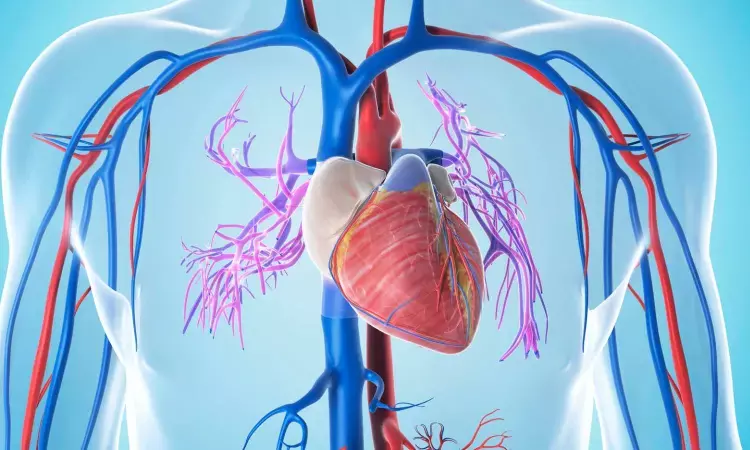- Home
- Medical news & Guidelines
- Anesthesiology
- Cardiology and CTVS
- Critical Care
- Dentistry
- Dermatology
- Diabetes and Endocrinology
- ENT
- Gastroenterology
- Medicine
- Nephrology
- Neurology
- Obstretics-Gynaecology
- Oncology
- Ophthalmology
- Orthopaedics
- Pediatrics-Neonatology
- Psychiatry
- Pulmonology
- Radiology
- Surgery
- Urology
- Laboratory Medicine
- Diet
- Nursing
- Paramedical
- Physiotherapy
- Health news
- Fact Check
- Bone Health Fact Check
- Brain Health Fact Check
- Cancer Related Fact Check
- Child Care Fact Check
- Dental and oral health fact check
- Diabetes and metabolic health fact check
- Diet and Nutrition Fact Check
- Eye and ENT Care Fact Check
- Fitness fact check
- Gut health fact check
- Heart health fact check
- Kidney health fact check
- Medical education fact check
- Men's health fact check
- Respiratory fact check
- Skin and hair care fact check
- Vaccine and Immunization fact check
- Women's health fact check
- AYUSH
- State News
- Andaman and Nicobar Islands
- Andhra Pradesh
- Arunachal Pradesh
- Assam
- Bihar
- Chandigarh
- Chattisgarh
- Dadra and Nagar Haveli
- Daman and Diu
- Delhi
- Goa
- Gujarat
- Haryana
- Himachal Pradesh
- Jammu & Kashmir
- Jharkhand
- Karnataka
- Kerala
- Ladakh
- Lakshadweep
- Madhya Pradesh
- Maharashtra
- Manipur
- Meghalaya
- Mizoram
- Nagaland
- Odisha
- Puducherry
- Punjab
- Rajasthan
- Sikkim
- Tamil Nadu
- Telangana
- Tripura
- Uttar Pradesh
- Uttrakhand
- West Bengal
- Medical Education
- Industry
Abnormal Free Fatty Acids Amplify Long-Term Cardiovascular Risk in Premature MI: Study

A recent study published in the Journal of the American Heart Association by Wu Y., Liu J., Zhang Y., and colleagues (2025) has highlighted a significant link between abnormal free fatty acid levels and long-term cardiovascular complications in patients who experience premature myocardial infarction.
The research, which focused on understanding the metabolic factors influencing post-infarction outcomes, found that both unusually low and high concentrations of circulating free fatty acids were associated with greater risks of major adverse cardiovascular events. The findings underscore that maintaining a balanced level of these fatty acids plays a critical role in heart health after an early heart attack.
Here’s the thing—free fatty acids serve as an important source of energy for the heart, but their imbalance can disrupt normal cardiac metabolism. According to the authors, when levels are either deficient or excessive, the heart’s ability to efficiently use energy becomes impaired, which may worsen inflammation, oxidative stress, and vascular dysfunction. Patients with abnormal free fatty acid levels who also showed signs of metabolic stress, such as higher inflammation markers or obesity, were found to have even poorer outcomes. This interaction suggests that free fatty acids may act as both indicators and amplifiers of cardiovascular risk, especially in those with metabolic comorbidities.
What this really means is that beyond cholesterol and glucose control, clinicians should consider assessing fatty acid balance when managing younger patients recovering from myocardial infarction. The study adds to a growing body of evidence showing that metabolic regulation is central to long-term heart health. It also opens the door for new therapeutic strategies aimed at stabilizing lipid metabolism as part of secondary prevention. As premature myocardial infarction continues to affect younger populations, the research highlights the importance of comprehensive metabolic evaluation and targeted interventions to reduce recurrence and improve survival.
Dr. Shravani Dali has completed her BDS from Pravara institute of medical sciences, loni. Following which she extensively worked in the healthcare sector for 2+ years. She has been actively involved in writing blogs in field of health and wellness. Currently she is pursuing her Masters of public health-health administration from Tata institute of social sciences. She can be contacted at editorial@medicaldialogues.in.
Dr Kamal Kant Kohli-MBBS, DTCD- a chest specialist with more than 30 years of practice and a flair for writing clinical articles, Dr Kamal Kant Kohli joined Medical Dialogues as a Chief Editor of Medical News. Besides writing articles, as an editor, he proofreads and verifies all the medical content published on Medical Dialogues including those coming from journals, studies,medical conferences,guidelines etc. Email: drkohli@medicaldialogues.in. Contact no. 011-43720751


